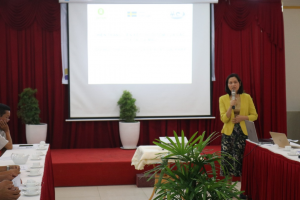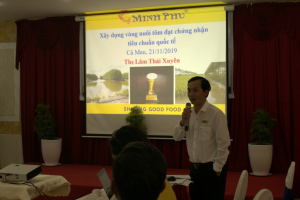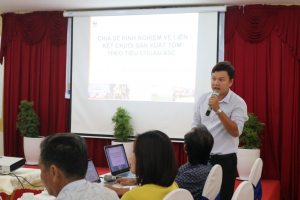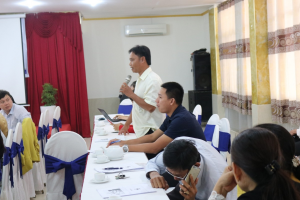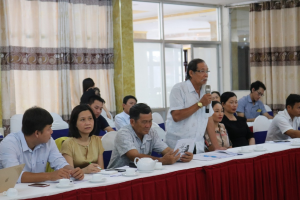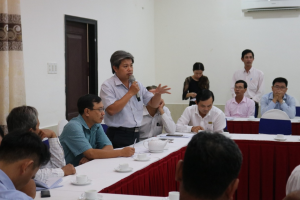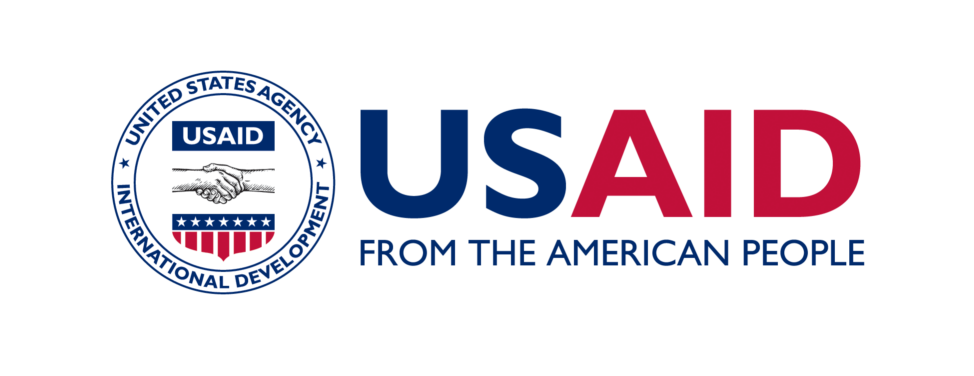News and events
Dialogue on promoting linkages and standards certification among smallholder farmers and other actors in the shrimp value chain in Ca Mau, Vietnam
On November 21, 2019, shrimp industry stakeholders participated in a dialogue in Ca Mau, Vietnam. Together, participants shared practical experiences, worked to remove difficulties in the process of linking cooperatives in shrimp production chains, and proposed solutions to promote and strengthen sustainable value chain linkages and improve certification practices.
The dialogue was co-organised by the Ca Mau Department of Agriculture and Rural Development (DARD), the Centre for Marinelife Conservation and Community Development (MCD), and the World Wildlife Fund (WWF) Vietnam. 60 delegates from Ca Mau shrimp farming cooperatives, export processing enterprises, input suppliers, certifying organizations, banks and credit institutions, the Ca Mau Farmers Association, the Ca Mau Women’s Union, and other affiliated groups participated in the dialogue.
Ms. Than Thi Hien, Deputy Director of MCD, began the dialogue with a presentation outlining the current context of the shrimp industry, the current status of shrimp cooperatives in Ca Mau, gaps between stakeholders, challenges, and potential solutions to create closer relationships between all actors in the chain.
According to DARD statistics, in 2018, the total aquaculture area in Ca Mau was 300,000 hectares, of which 280,000 hectares was shrimp farming area (accounting for 40% of the total shrimp farming area in Vietnam) that produced 158,000 tons of shrimp, 20% of the total shrimp production in Vietnam.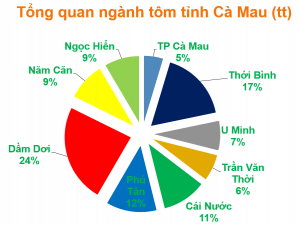
Shrimp production area by district/city in Ca Mau province
According to Ms. Hien, there are challenges in production chain linkages in the shrimp industry, including the limited farming techniques possessed by small-scale farmers that lead to low competitiveness in the market. Promoting linkages and the potential of the chain’s actors is essential to reducing production costs and increasing profits for both farmers and businesses, improving the traceability system will promote the expansion of farming areas, and linkages should be tied to importers for greater accountablity and commitment.
Photo 1. Ms. Than Thi Hien, Deputy Director of MCD, presented the current situation of linkages in the Ca Mau shrimp value chain
From the business perspective, Director of Minh Phu Social Enterprise Mr. Lam Thai Xuyen shared: “The most difficult thing in the shrimp chain is the certification issue for shrimp seed, so certification practices must be improved for all shrimp businesses”. Mr. Xuyen also proposed that a standard training program should be taught at fisheries universities and colleges in order to increase the trained human resources able to certify shrimp.
Photo 2. Mr. Lam Thai Xuyen, Director of Minh Phu Social Enterprise, shared about building a shrimp farming area certified with organic shrimp
Understanding the challenges faced by businesses, Mr. Nguyen Phuong Duy, WWF Vietnam Project Manager, shared a number of experiences including the cost of certification and shrimp chain linkages in Bac Lieu and Soc Trang. Currently, the demand for certified products is increasing; many international importers are interested in importing certified shrimp products and participating in the value chain such as Nordic Seafood, Northcoast Seafoods, and Fishtales. Therefore, investment sources are expanding with affiliate programs, more effective communication tools, and product promotion.
Photo 3. Mr. Nguyen Phuong Duy, WWF Project Manager, shared his experience in implementing shrimp chain linkages according to ASC standards
However, the Ca Mau shrimp industry still has major challenges accessing international markets. Mr. Duy mentioned the following five main issues: (1) The cost of certification is too high for small-scale farming households; (2) Aquaculture Stewardship Council (ASC) shrimp products of Vietnamese origin are widely distributed but the mechanism of traceability is not strict; (3) Market price volatility negatively affects the commitment of seafood processing companies to cooperatives; (4) Technical, financial, and managerial capacities of cooperatives/groups are not sufficient to carry out independent certification; and (5) There is a lack of commitment from international buyers and retailers to support small-scale shrimp farmers towards responsible production.
Continuing the discussion, representatives from enterprises and cooperatives shared problems in improving shrimp chain linkages.
Photo 4. Mr. Nguyen Van Lam, Director of Cai Bat Cooperative, Cai Nuoc, Ca Mau
Mr. Nguyen Van Lam, Director of Cai Bat Cooperative said: “Because of long-standing farming practices, it is difficult for people to buy and sell together. Moreover, lack of capital creates household debt to agents for the feed needed to produce seafood products. However, the financial resources of cooperatives are not strong enough to provide feed for the members ”.
In response to the previously mentioned shrimp feed problem, Mr. Nguyen Quoc Viet from CP Vietnam Corporation shared: “Recently, businesses, Ca Mau DARD, and OCB bank organized a joint conference to connect and support shrimp farmers to have sustainable approaches. CP is willing to sign contracts directly with cooperatives in Ca Mau, however, it is necessary to evaluate and consider the capacity of cooperatives and the bank’s financial guarantee mechanism to help people obtain seed, medicine, and feed according to the prescribed time”.
Photo 5. Mr. Lam Van Khiem, Chairman of Tan Long, Dam Doi, and Ca Mau shrimp cooperatives
Representative of Tan Long Cooperative, Mr. Lam Van Khiem, said that, “A difficulty for cooperatives is that people do not have the habit of certifying shrimp farming. Although participating in the shrimp value chain, enterprises have not been effectively purchasing from farmers. Tan Long Cooperative proposed to assess 200 hectares for the whole cooperative. Tan Long Cooperative wants to sign a contract directly with seafood businesses, but due to lack of capital, it has not been implemented yet”.
Photo 6. Mr. Nguyen Thanh Binh – Representatives of Cases enterprises
Regarding solutions to increase the value of shrimp products, Cases business representative Mr. Nguyen Thanh Binh proposed, “Cooperatives need to plan stocking and register the area and expected production with enterprises for businesses to have grounds for signing contracts with foreign units. For large markets, it is even more difficult to gain and maintain certification so businesses are still the key units to implement certification, but cooperatives are an important factor for successful shrimp certification. Vietnam shrimp should further promote reducing input costs and lowering product costs to compete with international businesses”.
Photo 7. Mr. Doan Thanh Hien, Head of Planning and Finance, Department of Agriculture and Rural Development, Ca Mau
At the end of the dialogue, Mr. Doan Thanh Hien, Head of Financial Planning for DARD Ca Mau summarized: “Cooperatives should take initiative in local business and production plans to negotiate the amount of raw materials with enterprises. Enterprises are a key actor in the process of certification and integration in shrimp farming. DARD Ca Mau is implementing the plan for organic agriculture in Ca Mau province in the period of 2020-2025 based on Decree No. 109/2018/ND-CP dated August 29, 2018 on organic agriculture and international standards. This is an opportunity to promote the shrimp industry, especially organic black tiger shrimp. Governments, businesses, and farmers need to work together closely”.
This activity is part of the project “Gender Transformative & Responsible Agribusiness Investments in South East Asia”, phase 2 (GRAISEA 2) funded by Embassy of Sweden in Bangkok through Oxfam International in Vietnam.
Read more
- MCD involves operating project with the Oceans 5 Program, an international network of donors committed to protect the world’s five oceans
- MCD PARTICIPATED IN THE 7TH IUCN ASIA REGIONAL CONSERVATION FORUM 2019 IN ISLAMABAD
- Opportunities and challenges, proposing to improve small-scale fishing (tuna) to contribute to reducing IUU in Binh Dinh Province



